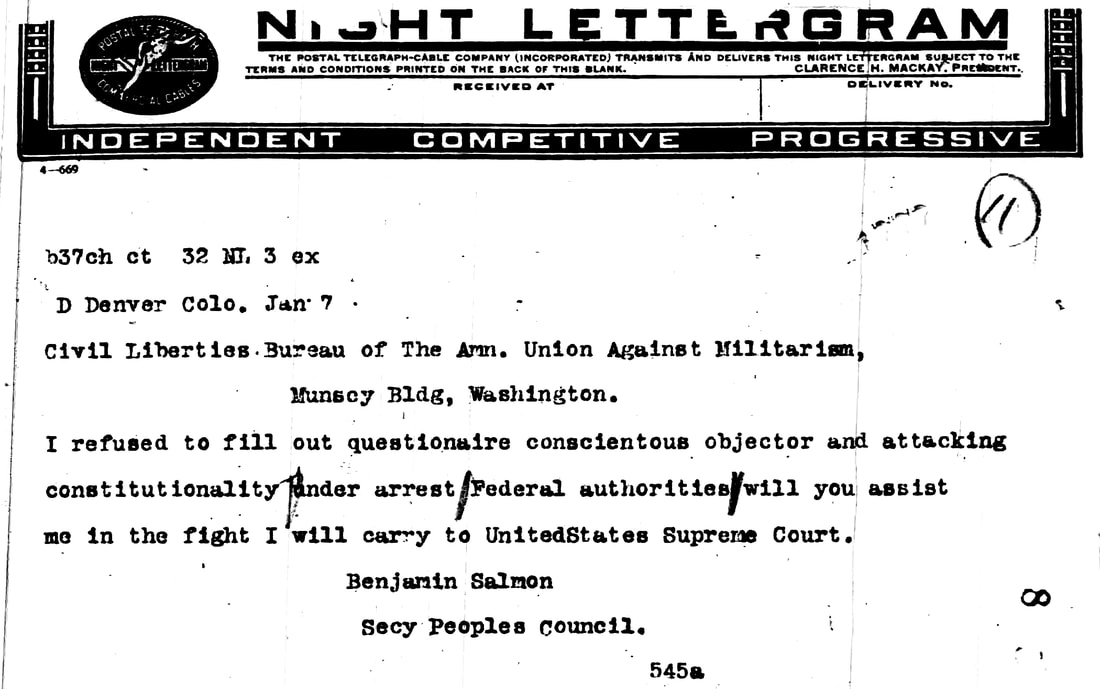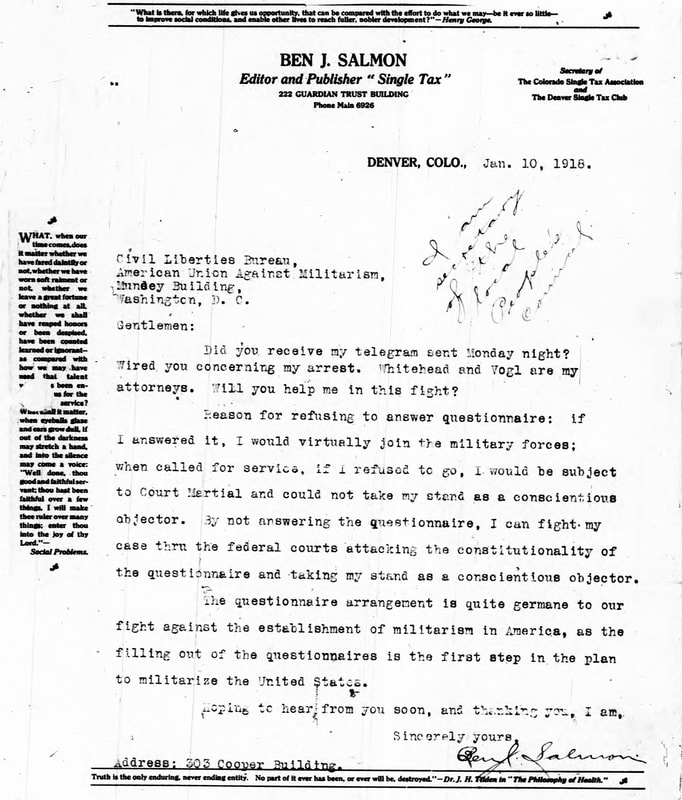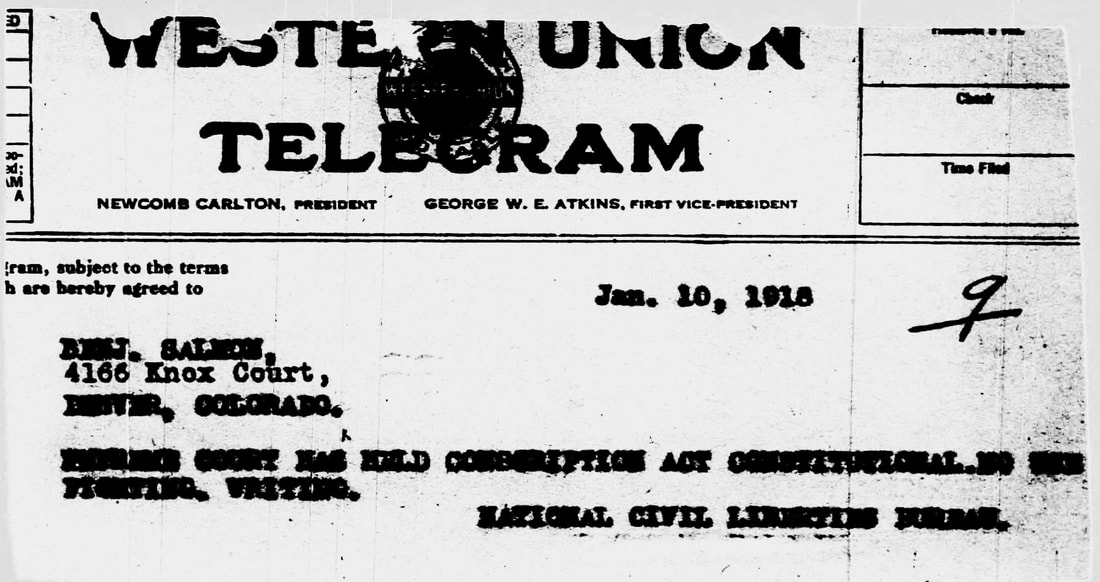|
Recall from the previous post, that Ben Salmon turned down his Christmas gift from the US Government, a questionnaire designed to help the Army decide where to place him when he was drafted. Not only did he turn it down, but he stated the questionnaire was part of an institution against which his soul rebelled. Federal law required potential draftees to complete and return the Questionnaire within 7 days. So on Friday, January 4th, 1918, Ben, having carried through with his stated plan to not return the questionnaire, was arrested and brought before the local draft board. Writing in 1920, Ben described that day as follows: “Having notified the Local Board by a letter dated December 26, 1917, that I would not answer the Questionnaire, the members of the Board sent two policemen to my home who brot me to the offices of the Local Board. My wife accompanied me as a witness. The members of the Board and their attorney tried to persuade me to fill out the Questionnaire.” And from the other side of the table, there are two descriptions of the events. The first taken from a newspaper account of the subsequent trial: "[Denver Draft Board No. 1 chief clerk] Mr. Mooney declared that subsequent to Salmon's arrest on Jan. 4th, the laws governing the questionnaire were fully explained to him, and he was afforded another opportunity to escape trouble, but still refused to comply with the rules." The second account of the arrest was found in a September 7, 1918 Army Judge Advocate General review of Ben Salmon's court-martial proceedings: “ (d) On January 4, 1918, by order of the local board form 1012 was prepared and placed in the hands of police officer Albert T. Clark for service. By this authority the police officer placed accused under arrest and brought him before the local board.... (e) On January 4, 1918, the same being more than seven full days after the expiration of the time for the return of the questionnaire, the local board in regular session, all members being present, in the presence of the accused tried the question as to whether or not accused was a willful delinquent and found him to be such. The accused was thereupon reported to the office of the United States District Attorney for prosecution.” For some reason, it seems the 'authorities' thought they could convert Ben Salmon to American militarism and he would then "escape trouble." Perhaps they had overlooked the statement in his June 5th, 1917 letter that "prison, or death, or both, are infinitely preferable to joining any branch of the army." The mere threat of arrest and trial did not faze Ben who was prepared to give his life in opposition. Having consciously decided to break the law, Ben Salmon reaped the consequences. His civil disobedience earned him a trial in Federal District Court on February 12, 1918 on the charge of Refusal to Return Questionnaire. Ben lost no time in preparing for the trial. He engaged the Denver firm of Whitehead and Vogl (Carle Whitehead was a Socialist as was Ben) and on Monday, January 7, sent the following telegram to the Civil Liberties Bureau of the American Union Against Militarism in Washington, DC. Since the NCLB (National Civil Liberties Bureau, predecessor to the present-day ACLU) did not immediately reply because the telegram delivery was delayed, Ben wrote a follow-up letter on January 10th: Obviously, the 'authorities' did not need to explain "the laws governing the questionnaire" to Ben Salmon as he was very familiar with the details of the law and had a legal strategy ready. He was ready to argue the case and follow his conscience all the way to the Supreme Court. Ben's plea to the NCLB for assistance in the fight did not bring the desired results. After sending the letter, Ben received the following, rather disheartening, reply to his original telegram. A bit hard to read, but the apparent reply was "SUPREME COURT HAS HELD CONSCRIPTION ACT CONSTITUTIONAL. NO USE FIGHTING. WRITING." The last sentence meant Roger Baldwin of the NCLB was sending an explanation letter through the mail that will be examined in the next post in this series. Again I'll spoil the suspense and reveal that Ben and the NCLB quickly reconciled their differences and the NCLB became a very staunch supporter of Ben's efforts.
Thus began a more than three-year correspondence between Ben Salmon and the NCLB (ACLU) that benefited not only both parties but also other conscientious objectors during WWI and, perhaps most importantly of all, benefits the world today as the NCLB archived the many exchanges and has made them available online allowing Ben's voice to be heard in the 21st century. - Steve Smith
3 Comments
2/27/2018 09:01:04 pm
Using original documents to bring understanding of the past is first rate historiography. Thank you for doing this Mr. Smith.
Reply
Tom McGuire
12/18/2019 03:02:58 pm
When "A Hidden Life" the movie about Franz and Franziska Jaegerstatter struggle with Franz's refusal to to fight in the Nazi Army, is an oppoertunity to inform people in Chicago about Ben Salmon. The Movie will come to Chicago, please let us know so we can post information about the movie and Ben Salmon in our communities.
Reply
12/18/2019 04:43:47 pm
Tom McGuire asks "can we post information about the movie (A Hidden Life) and Ben Salmon inner communities.
Reply
Leave a Reply. |
AuthorWrite something about yourself. No need to be fancy, just an overview. ArchivesCategories |



 RSS Feed
RSS Feed